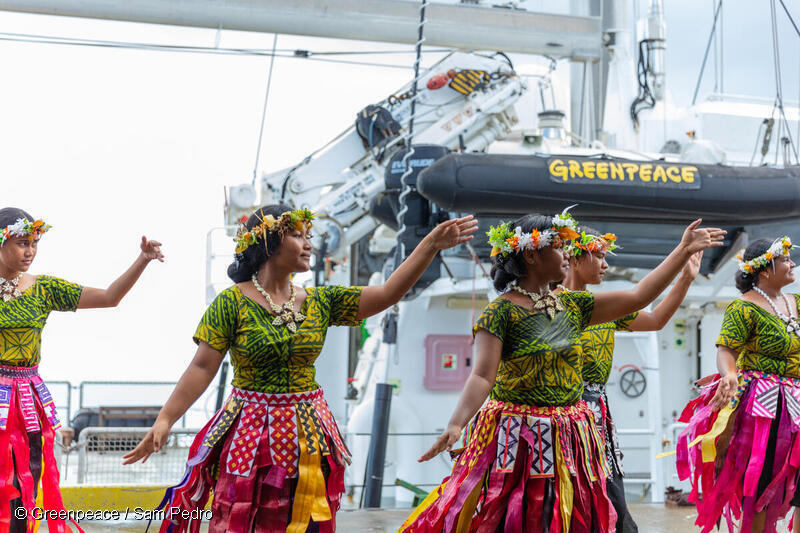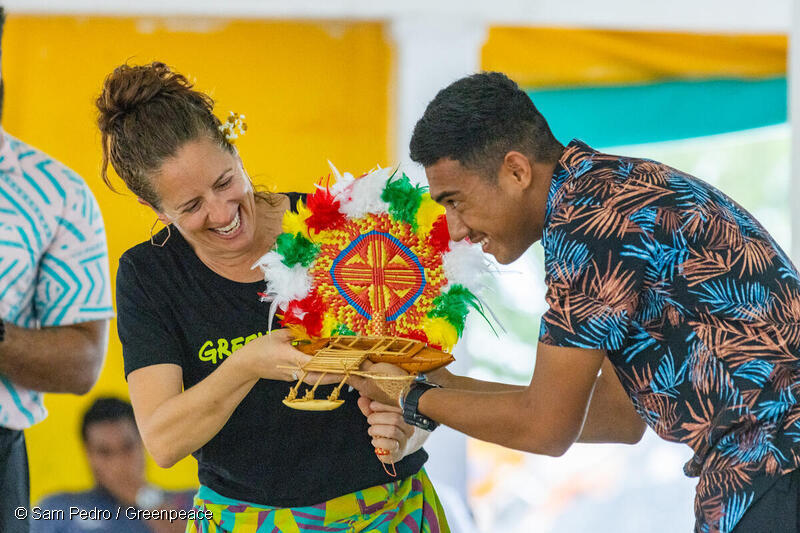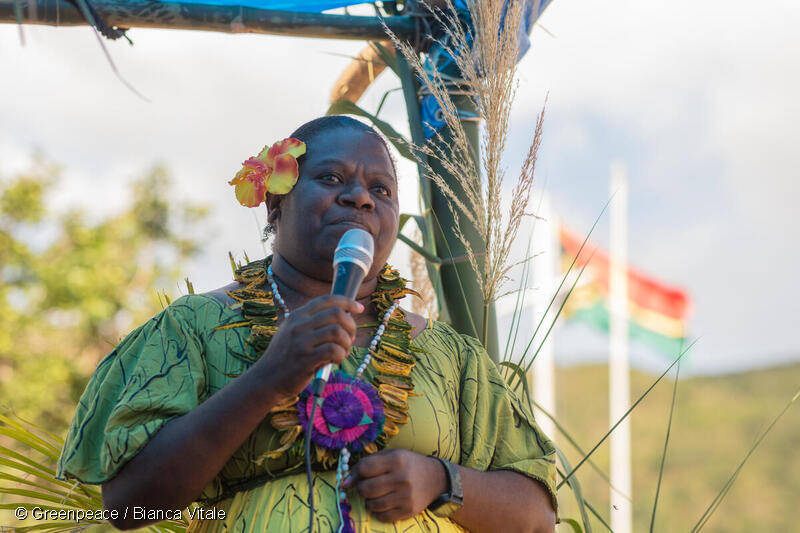
Traditional paopao (canoes) escorted the arriving ship to shore, where those aboard were welcomed by the community of Tuvalu, civil society groups, and addressed by Representatives from the Government of Tuvalu including the Hon. Prime Minister Kausea Natano and the Hon. Minister for Finance and Climate Change Seve Paeniu.
Tuvalu is one of the most climate-vulnerable nations in the world. With much of the country sitting at less than three metres in elevation, sea level rise and storm surges are not only leading to tidal inundation, food insecurity and cultural loss, but present an immediate threat to Tuvalu’s future.
During the visit, Greenpeace campaigners will meet with community and government leaders to listen and engage in ‘talanoa’ or discussion, and to learn how best to support Pacific climate demands. Greenpeace experts will continue gathering testimonies of climate harm to present to the world’s highest court as part of the historic, Pacific-led campaign for an advisory opinion at the International Court of Justice.|A farewell ceremony is also a cultural protocol in the Pacific.
The Rainbow Warrior (RW) by now would have become a big part of the Tuvalu family. The event includes being farewelled by a traditional Fatele (traditional dance movements and music style used by village communities, symbolising friendships) and speeches from on ground partners and allies.’I-tatau’, a Tuvaluan term that refers to a traditional form of welcoming and showing respect, is an important part of the ceremony to symbolise the RW leaving a beautiful part of her soul and legacy in Tuvalu. We will end our stay with a collective gathering over traditional food to say our ‘Fetaui’ (meaning friend) see you again to the new relationships that we have built and the older ones we have strengthened.|One of the 2 islands severely impacted by Cyclone PAM was also devastated by Cyclone Judy and Cyclone Kevin in 2023 (2 Cat 4-5 cyclones in 2 days). ActionAid Vanuatu Women’s network provides early warning systems in the island communities to better prepare and respond to cyclones of such strength. They also are one of the first to hit the ground to do post disaster relief work. Their women’s network team will work closely with Greenpeace during the visit in Erromango.
Erromango also has a rich cultural history and still practices some beautiful age-old traditions. The first day will be prepared as talanoa between the village communities, elders and the Greenpeace crew and CSOs that will join us.
Talanoa or dialogue is an important part of the Pasifika community and how decisions are made where the leader/chief facilitates the conversation. It is structured, with a purpose, and with an end output – it has ‘mana’
It is often used in the context of community-building, conflict resolution, and decision-making. In a talanoa, participants are encouraged to share their personal stories, perspectives, and experiences in a safe and respectful environment, with the goal of promoting understanding and finding common ground.|A traditional dance is performed at the arrival of the Rainbow Warrior in Funafuti, the second stop of the Pacific Ship Tour.
Traditional paopao (canoes) escorted the arriving ship to shore, where those aboard were welcomed by the community of Tuvalu, civil society groups, and addressed by Representatives from the Government of Tuvalu including the Hon. Prime Minister Kausea Natano and the Hon. Minister for Finance and Climate Change Seve Paeniu.
Tuvalu is one of the most climate-vulnerable nations in the world. With much of the country sitting at less than three metres in elevation, sea level rise and storm surges are not only leading to tidal inundation, food insecurity and cultural loss, but present an immediate threat to Tuvalu’s future.
During the visit, Greenpeace campaigners will meet with community and government leaders to listen and engage in ‘talanoa’ or discussion, and to learn how best to support Pacific climate demands. Greenpeace experts will continue gathering testimonies of climate harm to present to the world’s highest court as part of the historic, Pacific-led campaign for an advisory opinion at the International Court of Justice.
It was March this year, during a United Nations General Assembly, that 132 countries voted “yes” for Pacific Climate Justice.
Specifically, these countries passed a motion proposed by the Vanuatu government, calling on the International Court of Justice to deliver an advisory opinion that confirms the devastating impacts of climate change on human rights..
In doing so, the International Court of Justice Advisory Opinion (or ICJ AO for short) would clarify the obligations owed by countries to protect the rights of both current and future generations from climate change.
We know that strong and compelling evidence about the impacts that climate change is already having on communities across the world will play a key role in convincing the court to hand down a decisive and authoritative opinion. That’s why the Rainbow Warrior visited the Pacific earlier this year; to document the human rights impacts of climate change in this region.
We sailed to Port Vila and Erromango in Vanuatu, then onwards to Tuvalu, followed by Suva, Kioa, and Rabi – all islands in Fiji. We were welcomed into the homes and hearts of countless people who most generously shared their experience of a changing climate and how it has impacted on their human rights to their homes, their cultures, and their livelihoods. These stories will live on in our hearts, and amplify the strength of our upcoming submission to the International Court of Justice. Read on for some of these stories from the island of Pele – just one of the many places we visited whilst in the Pacific.

A farewell ceremony is a cultural protocol in the Pacific.
We walked with a local healer named Winnie, who recalled the uses of the medicinal plants that have been lost due to climate change and shared the repercussions of this loss for her children when they fall ill.
We knelt with Sister Lizzie in a Pele graveyard and mourned after we learned that an additional 20 of the village’s ancestral graves had been swallowed by the sea since her last visit to the site which was a day before the twin cyclones Judy and Kevin hit the region in March this year.
Flora Vano, country manager for ActionAid Vanuatu has been helping communities face the dangers of a changing climate. She shared with us how when the twin cyclones came, communication with Erromango was down. Nobody answered her calls, leaving her to wonder if anyone on Erromango had survived at all. It was three days before Flora heard that there were no casualties, thanks to all the hard work that the women had done to fortify their communities beforehand. Watch her story in full with this video.

ActionAid Vanuatu Women’s network provides early warning systems in the island communities to better prepare and respond to cyclones of great strength.
Women are not only disproportionately impacted by climate change, but are also often the first responders to climate disasters. Flora is advocating for the leadership of Indigenous women to be acknowledged as a powerful treasure in building climate resilience.
The ICJ AO’s potential to safeguard the human rights of frontline communities, current and future generations in the face of climate change, is why this work is of utmost importance to Greenpeace. Our mission to secure a strong Advisory Opinion is also something that we feel will strongly resonate with you, a legacy gift supporter, who has made a generous commitment to protect future generations through a gift in your Will.

